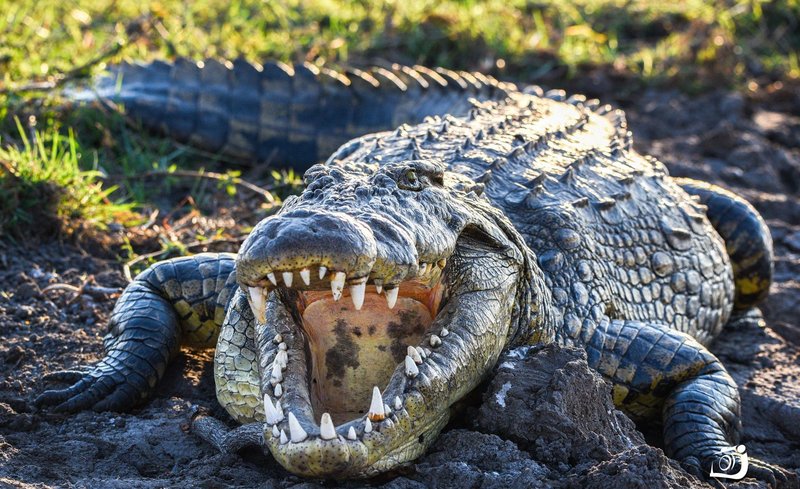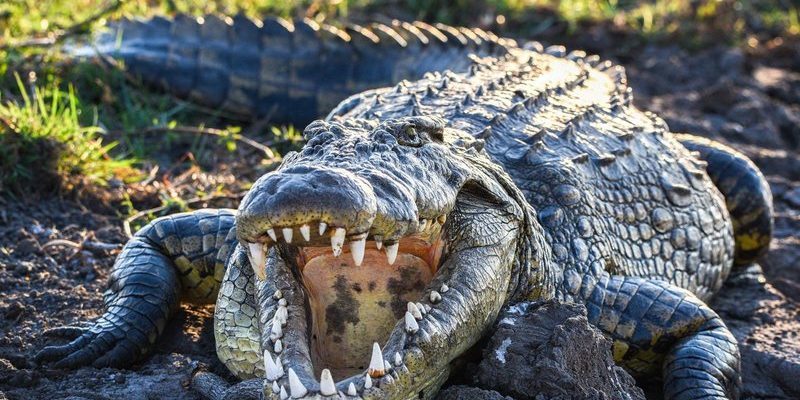
But why are we so intrigued by crocodiles? Maybe it’s their fierce appearance, or perhaps it’s their stealthy hunting techniques. Whichever the case, these creatures serve as symbols in many cultures, representing everything from wisdom to chaos. Let’s take a deeper dive into how crocodiles pop up in folklore, art, and even spiritual beliefs around the globe.
Crocodiles in Ancient Mythology
When you think about ancient stories and myths, it’s common to find crocodiles lurking behind the curtain. In Egyptian mythology, the crocodile was associated with the god Sobek, who was believed to control the Nile and impart fertility. People honored this reptile, worshiping it as a protector of the waters. Imagine ancient Egyptians adoring these creatures for their strength while also fearing their ferocity. Sobek represented the dual nature of life—creation and destruction—reminding us how powerful and unpredictable nature can be.
Other cultures, too, have threads of crocodile mythology woven into their stories. In African folklore, crocodiles often symbolize cunning and shrewdness. Many tales depict them as clever tricksters who outsmart their prey. This aligns with the idea of survival; in nature, being cunning often means staying alive. Australian Aboriginal cultures view crocodiles in a similar light, representing both danger and life lessons, reflecting how humans can learn from nature’s wisdom.
So, the next time you hear a story involving a crocodile, remember that there’s often a deeper meaning tied to it—an exploration of human experience wrapped up in reptilian tales.
Crocodiles in Literature
Crocodiles have slithered their way into literature throughout history, often serving as powerful symbols. In children’s books, they can be depicted as friendly figures, like the beloved character in “Mr. Crocodile.” This playful portrayal might make you chuckle, but it also opens up discussions about how we view these creatures. Honestly, presenting crocodiles as amiable can help demystify them for younger audiences, making them more approachable.
On the other end of the spectrum, in darker tales, crocodiles often embody danger and treachery. For instance, in stories like “The Jungle Book,” the character of Kaa, the snake, has crocodilian traits, hinting at stealth and manipulation in his behavior. This complex representation can evoke feelings of fear and caution, illustrating how powerful storytelling becomes when it intertwines with cultural perceptions.
In works of fantasy, like some of J.K. Rowling’s Harry Potter series, crocodiles and their relatives—like the giant Basilisk—serve to highlight themes of fear versus bravery. They challenge characters to confront their deepest worries, blending the essence of these reptiles into narratives that are both thrilling and thought-provoking.
Folklore and Wisdom Traditions
Across various cultures, crocodiles often embody wisdom and ancient knowledge. In many Native American legends, they’re seen as guardians of rivers and lakes, holding secrets of creation and the natural world. This mystical representation shows how these creatures aren’t just fierce predators but also keepers of vital life lessons that humans can learn from if we’re willing to listen.
The Maasai people of East Africa have a unique take on crocodiles. They view them as both a source of danger and a symbol of resilience, often sharing stories that teach younger generations how to coexist with wildlife. This respect for the crocodile reflects a broader understanding of nature—recognizing that even the most fearsome creatures have their places in the cycle of life.
Let’s face it, if we view crocodiles exclusively as terrifying beasts, we miss out on the valuable teachings they can offer. They remind us of nature’s balance, urging us to respect and protect our environment.
Crocodiles in Art and Symbolism
Crocodiles have inspired countless pieces of art throughout history. From ancient pottery to modern sculptures, these creatures often appear in various forms and styles. Their fierce likeness can symbolize strength, tenacity, and even immortality. For example, in artifacts from ancient Egypt, crocodile imagery was common, often carved alongside hieroglyphics to signify the river’s life-giving qualities.
In modern art, crocodiles might be stylized to provoke thought or challenge viewers to confront their fears. Artists often use their features to symbolize chaos or the unknown. This duality can spark discussions about how we perceive danger in our lives—much like we do with crocodiles.
Moreover, the appearance of crocodiles in tattoos also reflects their complex symbolism. Many choose to get inked with images of crocodiles as a reminder of their strength or as a tribute to their cultural heritage. Each tattoo tells a story, reflecting personal beliefs and experiences tied to these powerful creatures.
Crocodiles and Spiritual Beliefs
In many cultures, crocodiles play significant roles in spiritual beliefs and rituals. Some African tribes view them as protective spirits, believing that having a crocodile’s image can ward off evil. Rituals often include offerings to these reptiles, showcasing a deep respect for their perceived power and wisdom. It’s as if they’re seen as bridges between the physical and spiritual worlds.
In contrast, in some Asian cultures, crocodiles are viewed more skeptically, often representing greed or treachery. This view can pop up in stories where the crocodile represents betrayal or the dangers of unchecked ambition. It’s interesting how one creature can hold such different meanings across cultures, highlighting the rich tapestry of human belief.
Ultimately, whether revered or feared, crocodiles have firmly embedded themselves in the spiritual fabric of many societies, reminding us that nature’s creatures can teach us about our own lives.
The Role of Crocodiles in Modern Pop Culture
Today, crocodiles continue to swim through our modern consciousness thanks to movies, TV shows, and social media. They often appear in films—not just as fearsome creatures but as quirky characters bringing humor or wisdom. Take the animated movie “Rio,” for instance, where a crocodile plays a supporting role, showcasing how they can be relatable and fun.
Social media, too, has jumped on the crocodile bandwagon, with viral videos showcasing their clumsy yet fascinating behaviors. Let’s be real; who hasn’t enjoyed watching a crocodile basking in the sun or attempting to eat a watermelon? These interactions make crocodiles seem less intimidating and more endearing, ultimately reshaping their image in popular culture.
We’ve also seen an explosion of crocodile-themed merchandise, from toys to clothing. They’ve become a sort of cultural icon, representing adventure, resilience, and the thrill of nature. Honestly, it’s hard not to smile when you see a cute crocodile plushie!
In summary, crocodiles have made a splash in cultures and folklore around the world. They embody a vast array of meanings—protectors, tricksters, and symbols of wisdom. From ancient myths to modern pop culture, these creatures remind us of nature’s complexity and power.
It’s fascinating to see how a reptile that might strike fear into our hearts can also teach us valuable lessons about resilience, respect, and understanding the balance of life. So the next time you come across a crocodile—be it in a story, art piece, or even a documentary—take a moment to appreciate the depth of what these magnificent creatures represent. They’re more than just fearsome predators; they’re woven into the very fabric of our shared human experience.

